Analysis of International Business Environment and Trade for HUL
VerifiedAdded on 2020/06/04
|12
|4011
|312
Report
AI Summary
This report provides an executive summary and in-depth analysis of Hindustan Unilever Limited's (HUL) international business environment and trade. It begins with an introduction to international business, defining key concepts and the global expansion of markets. The report then delves into HUL's background, including its history, products, and market position, followed by a literature review of transnational frameworks, competitive strategies, and organizational challenges. The analysis examines various aspects of HUL's international operations, including market mentality, competitive challenges, organizational structures, innovation, and collaborative strategies. The report also explores the geographical focus of HUL's international business and concludes with recommendations for improving organizational activities and expanding business at the international level. The assignment uses various online materials and sources to provide a comprehensive research on HUL's international business in the context of global market.
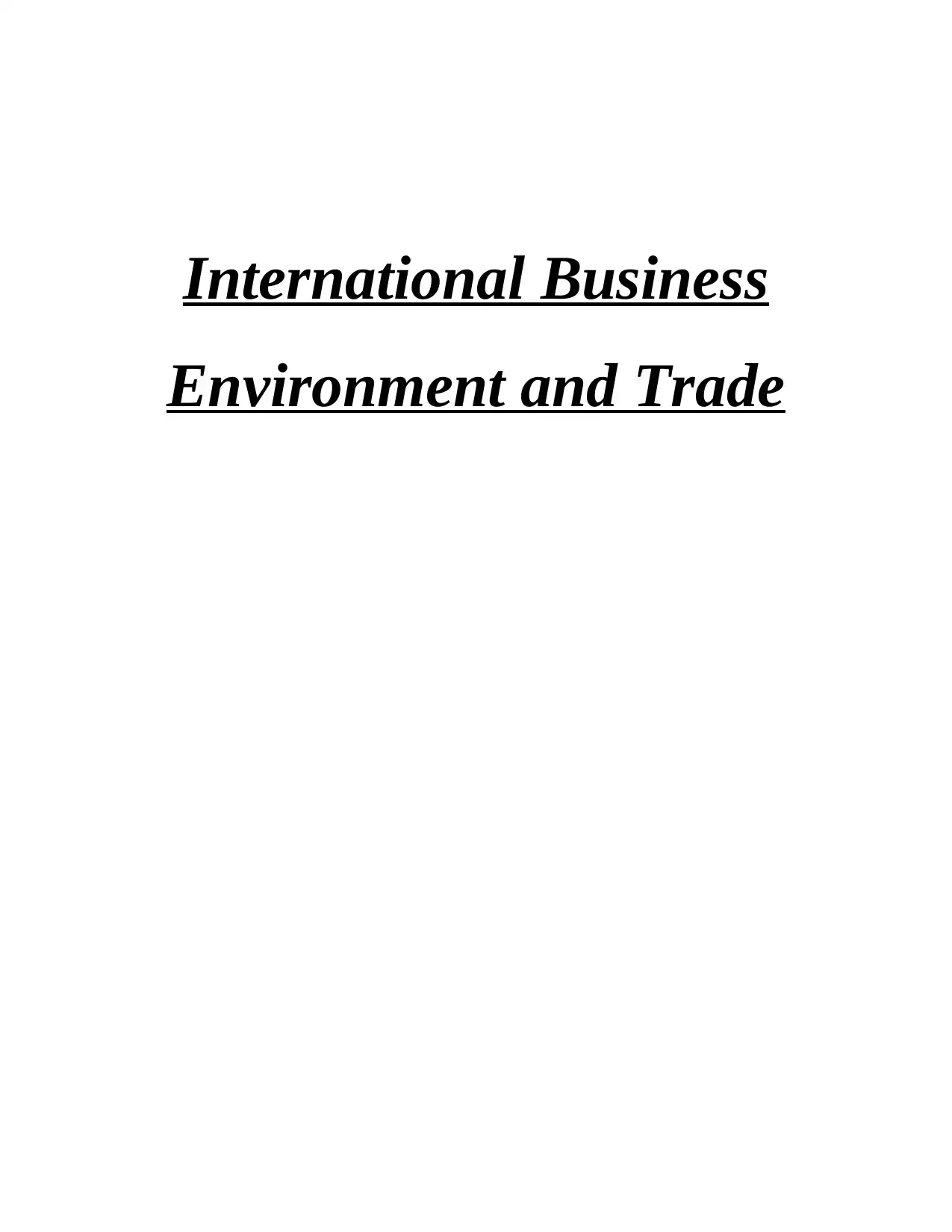
International Business
Environment and Trade
Environment and Trade
Paraphrase This Document
Need a fresh take? Get an instant paraphrase of this document with our AI Paraphraser
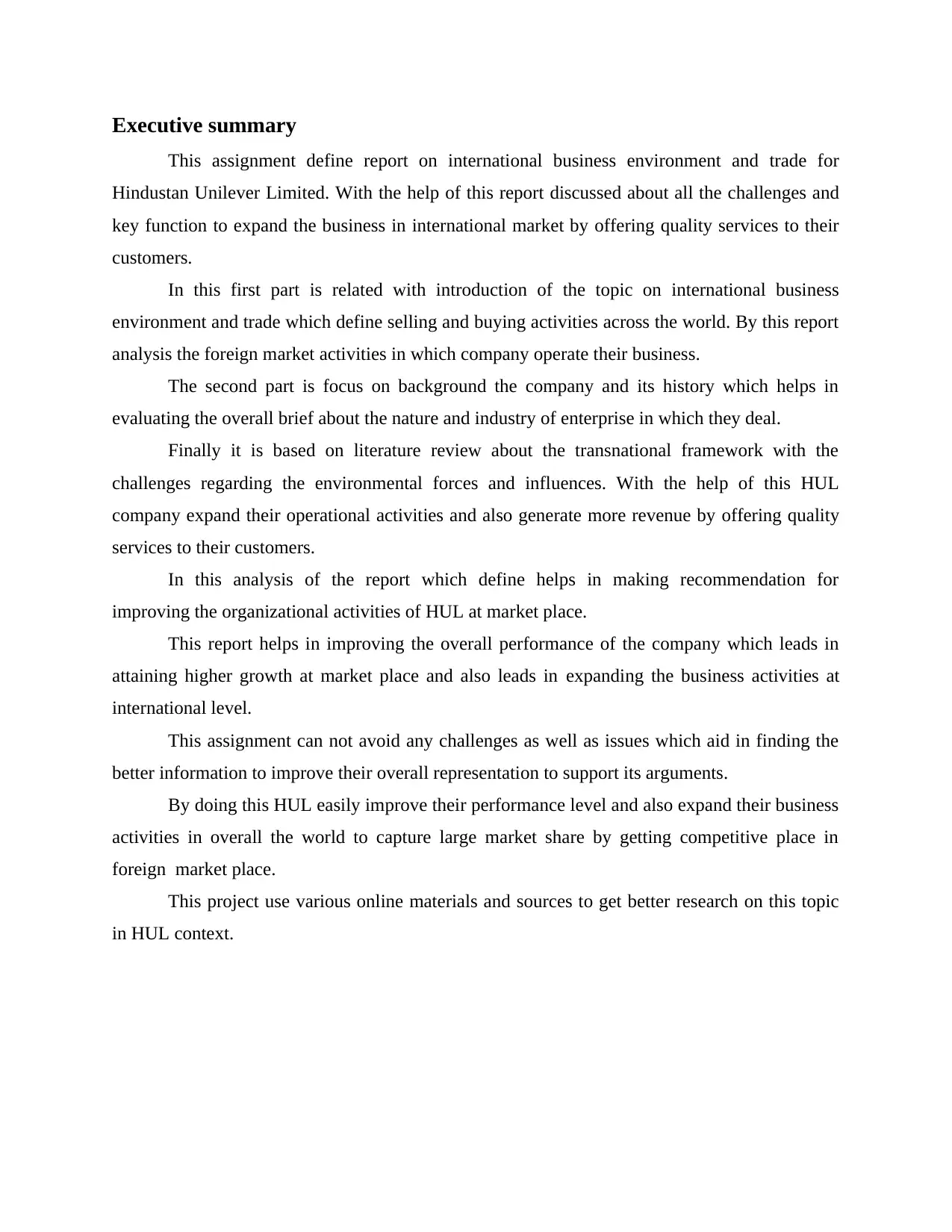
Executive summary
This assignment define report on international business environment and trade for
Hindustan Unilever Limited. With the help of this report discussed about all the challenges and
key function to expand the business in international market by offering quality services to their
customers.
In this first part is related with introduction of the topic on international business
environment and trade which define selling and buying activities across the world. By this report
analysis the foreign market activities in which company operate their business.
The second part is focus on background the company and its history which helps in
evaluating the overall brief about the nature and industry of enterprise in which they deal.
Finally it is based on literature review about the transnational framework with the
challenges regarding the environmental forces and influences. With the help of this HUL
company expand their operational activities and also generate more revenue by offering quality
services to their customers.
In this analysis of the report which define helps in making recommendation for
improving the organizational activities of HUL at market place.
This report helps in improving the overall performance of the company which leads in
attaining higher growth at market place and also leads in expanding the business activities at
international level.
This assignment can not avoid any challenges as well as issues which aid in finding the
better information to improve their overall representation to support its arguments.
By doing this HUL easily improve their performance level and also expand their business
activities in overall the world to capture large market share by getting competitive place in
foreign market place.
This project use various online materials and sources to get better research on this topic
in HUL context.
This assignment define report on international business environment and trade for
Hindustan Unilever Limited. With the help of this report discussed about all the challenges and
key function to expand the business in international market by offering quality services to their
customers.
In this first part is related with introduction of the topic on international business
environment and trade which define selling and buying activities across the world. By this report
analysis the foreign market activities in which company operate their business.
The second part is focus on background the company and its history which helps in
evaluating the overall brief about the nature and industry of enterprise in which they deal.
Finally it is based on literature review about the transnational framework with the
challenges regarding the environmental forces and influences. With the help of this HUL
company expand their operational activities and also generate more revenue by offering quality
services to their customers.
In this analysis of the report which define helps in making recommendation for
improving the organizational activities of HUL at market place.
This report helps in improving the overall performance of the company which leads in
attaining higher growth at market place and also leads in expanding the business activities at
international level.
This assignment can not avoid any challenges as well as issues which aid in finding the
better information to improve their overall representation to support its arguments.
By doing this HUL easily improve their performance level and also expand their business
activities in overall the world to capture large market share by getting competitive place in
foreign market place.
This project use various online materials and sources to get better research on this topic
in HUL context.
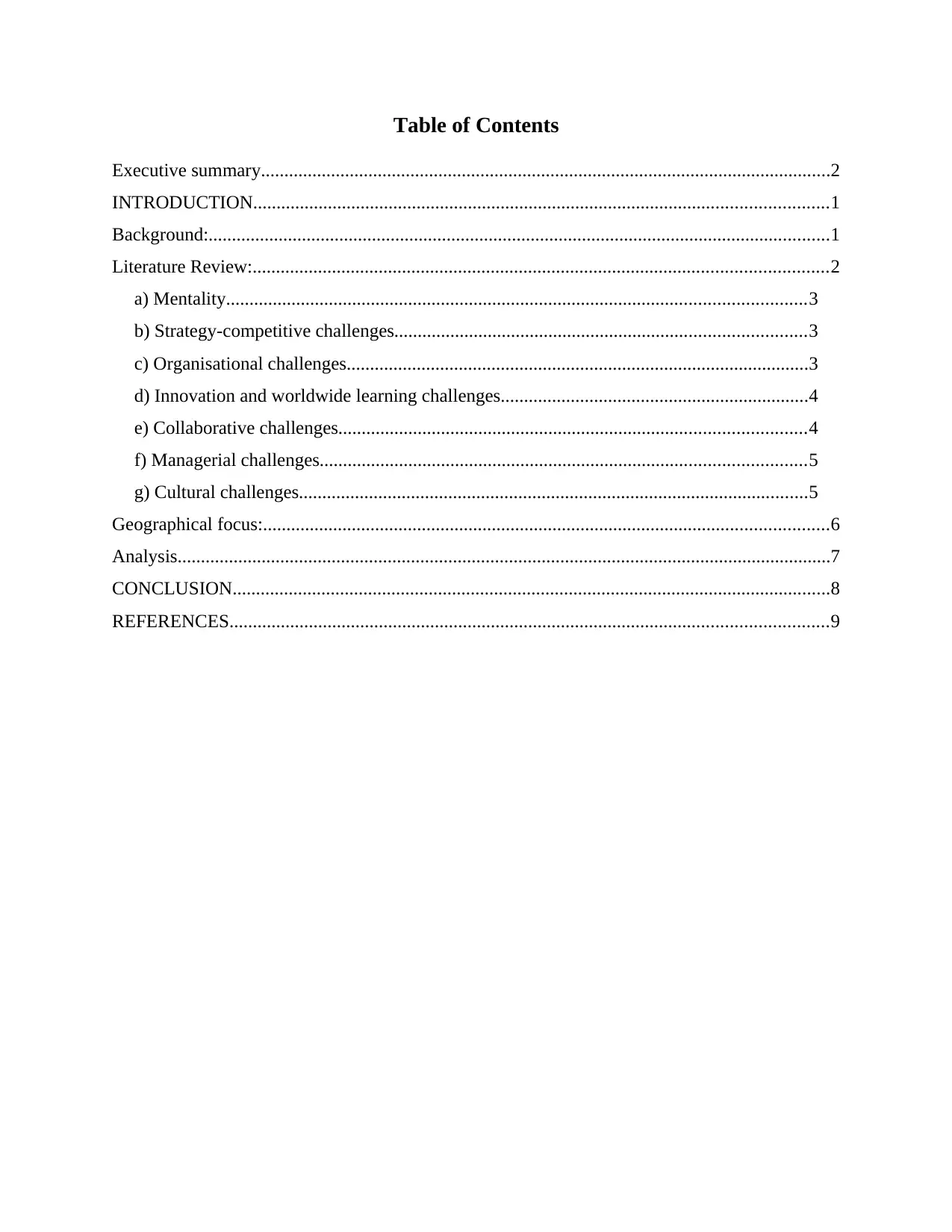
Table of Contents
Executive summary..........................................................................................................................2
INTRODUCTION...........................................................................................................................1
Background:.....................................................................................................................................1
Literature Review:...........................................................................................................................2
a) Mentality............................................................................................................................3
b) Strategy-competitive challenges........................................................................................3
c) Organisational challenges...................................................................................................3
d) Innovation and worldwide learning challenges..................................................................4
e) Collaborative challenges....................................................................................................4
f) Managerial challenges........................................................................................................5
g) Cultural challenges.............................................................................................................5
Geographical focus:.........................................................................................................................6
Analysis............................................................................................................................................7
CONCLUSION................................................................................................................................8
REFERENCES................................................................................................................................9
Executive summary..........................................................................................................................2
INTRODUCTION...........................................................................................................................1
Background:.....................................................................................................................................1
Literature Review:...........................................................................................................................2
a) Mentality............................................................................................................................3
b) Strategy-competitive challenges........................................................................................3
c) Organisational challenges...................................................................................................3
d) Innovation and worldwide learning challenges..................................................................4
e) Collaborative challenges....................................................................................................4
f) Managerial challenges........................................................................................................5
g) Cultural challenges.............................................................................................................5
Geographical focus:.........................................................................................................................6
Analysis............................................................................................................................................7
CONCLUSION................................................................................................................................8
REFERENCES................................................................................................................................9
⊘ This is a preview!⊘
Do you want full access?
Subscribe today to unlock all pages.

Trusted by 1+ million students worldwide
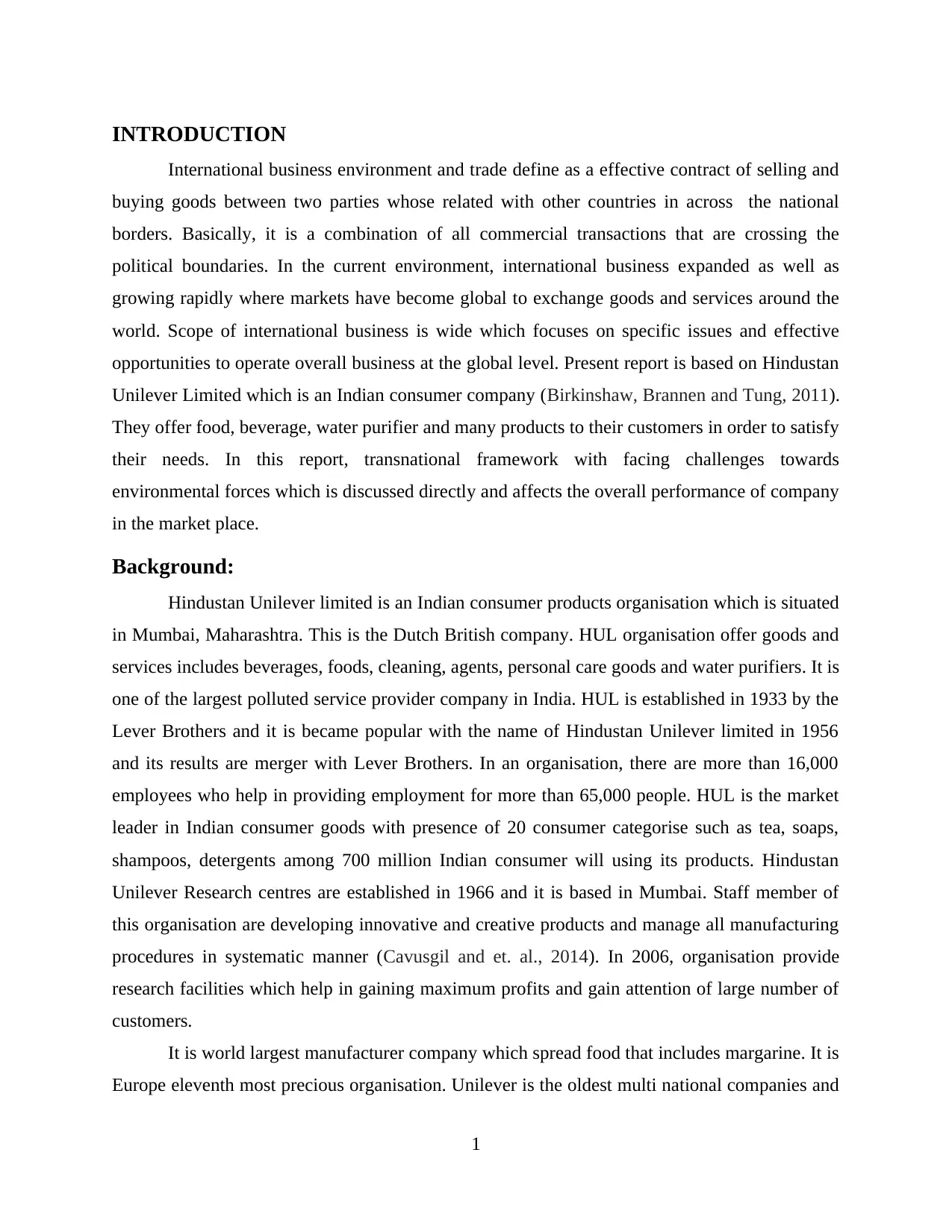
INTRODUCTION
International business environment and trade define as a effective contract of selling and
buying goods between two parties whose related with other countries in across the national
borders. Basically, it is a combination of all commercial transactions that are crossing the
political boundaries. In the current environment, international business expanded as well as
growing rapidly where markets have become global to exchange goods and services around the
world. Scope of international business is wide which focuses on specific issues and effective
opportunities to operate overall business at the global level. Present report is based on Hindustan
Unilever Limited which is an Indian consumer company (Birkinshaw, Brannen and Tung, 2011).
They offer food, beverage, water purifier and many products to their customers in order to satisfy
their needs. In this report, transnational framework with facing challenges towards
environmental forces which is discussed directly and affects the overall performance of company
in the market place.
Background:
Hindustan Unilever limited is an Indian consumer products organisation which is situated
in Mumbai, Maharashtra. This is the Dutch British company. HUL organisation offer goods and
services includes beverages, foods, cleaning, agents, personal care goods and water purifiers. It is
one of the largest polluted service provider company in India. HUL is established in 1933 by the
Lever Brothers and it is became popular with the name of Hindustan Unilever limited in 1956
and its results are merger with Lever Brothers. In an organisation, there are more than 16,000
employees who help in providing employment for more than 65,000 people. HUL is the market
leader in Indian consumer goods with presence of 20 consumer categorise such as tea, soaps,
shampoos, detergents among 700 million Indian consumer will using its products. Hindustan
Unilever Research centres are established in 1966 and it is based in Mumbai. Staff member of
this organisation are developing innovative and creative products and manage all manufacturing
procedures in systematic manner (Cavusgil and et. al., 2014). In 2006, organisation provide
research facilities which help in gaining maximum profits and gain attention of large number of
customers.
It is world largest manufacturer company which spread food that includes margarine. It is
Europe eleventh most precious organisation. Unilever is the oldest multi national companies and
1
International business environment and trade define as a effective contract of selling and
buying goods between two parties whose related with other countries in across the national
borders. Basically, it is a combination of all commercial transactions that are crossing the
political boundaries. In the current environment, international business expanded as well as
growing rapidly where markets have become global to exchange goods and services around the
world. Scope of international business is wide which focuses on specific issues and effective
opportunities to operate overall business at the global level. Present report is based on Hindustan
Unilever Limited which is an Indian consumer company (Birkinshaw, Brannen and Tung, 2011).
They offer food, beverage, water purifier and many products to their customers in order to satisfy
their needs. In this report, transnational framework with facing challenges towards
environmental forces which is discussed directly and affects the overall performance of company
in the market place.
Background:
Hindustan Unilever limited is an Indian consumer products organisation which is situated
in Mumbai, Maharashtra. This is the Dutch British company. HUL organisation offer goods and
services includes beverages, foods, cleaning, agents, personal care goods and water purifiers. It is
one of the largest polluted service provider company in India. HUL is established in 1933 by the
Lever Brothers and it is became popular with the name of Hindustan Unilever limited in 1956
and its results are merger with Lever Brothers. In an organisation, there are more than 16,000
employees who help in providing employment for more than 65,000 people. HUL is the market
leader in Indian consumer goods with presence of 20 consumer categorise such as tea, soaps,
shampoos, detergents among 700 million Indian consumer will using its products. Hindustan
Unilever Research centres are established in 1966 and it is based in Mumbai. Staff member of
this organisation are developing innovative and creative products and manage all manufacturing
procedures in systematic manner (Cavusgil and et. al., 2014). In 2006, organisation provide
research facilities which help in gaining maximum profits and gain attention of large number of
customers.
It is world largest manufacturer company which spread food that includes margarine. It is
Europe eleventh most precious organisation. Unilever is the oldest multi national companies and
1
Paraphrase This Document
Need a fresh take? Get an instant paraphrase of this document with our AI Paraphraser
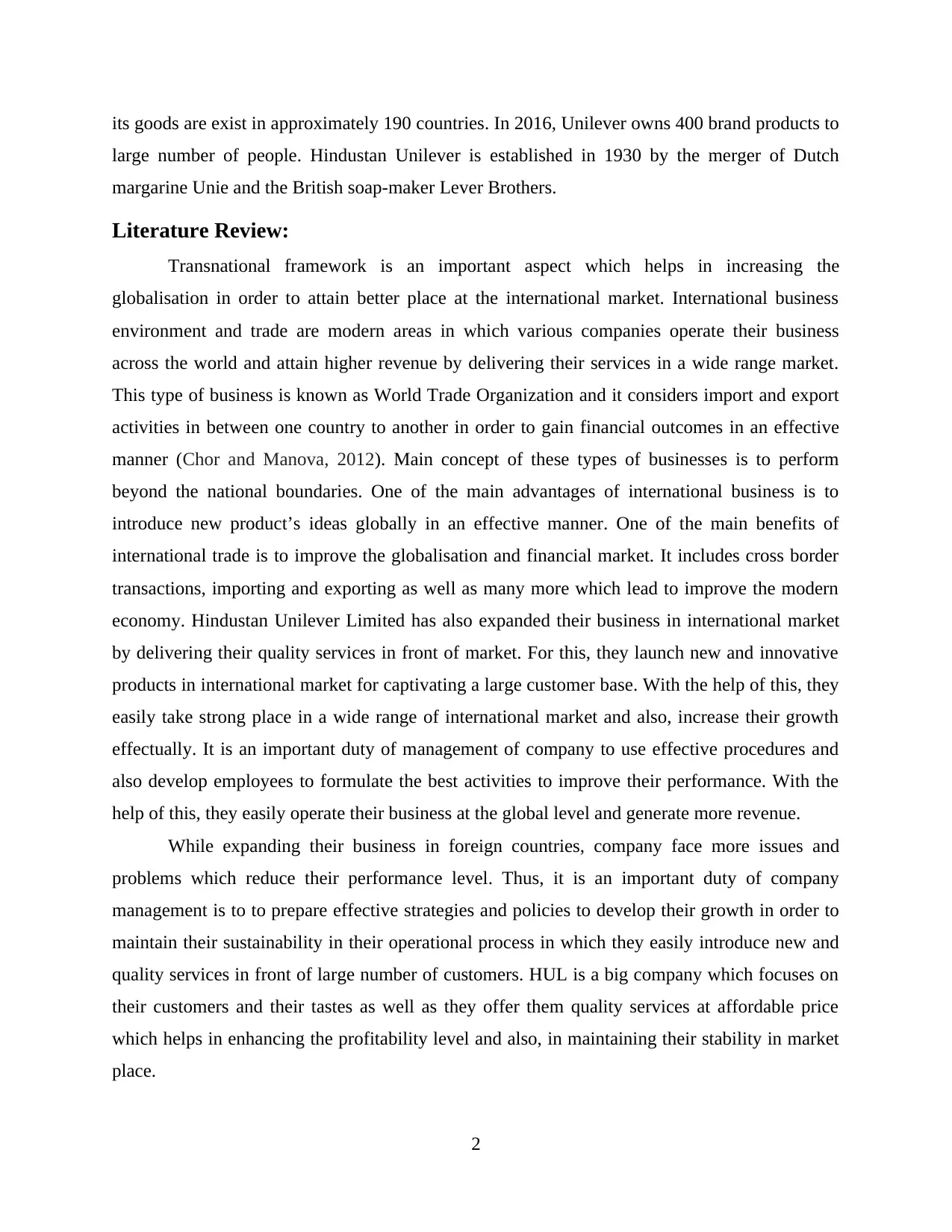
its goods are exist in approximately 190 countries. In 2016, Unilever owns 400 brand products to
large number of people. Hindustan Unilever is established in 1930 by the merger of Dutch
margarine Unie and the British soap-maker Lever Brothers.
Literature Review:
Transnational framework is an important aspect which helps in increasing the
globalisation in order to attain better place at the international market. International business
environment and trade are modern areas in which various companies operate their business
across the world and attain higher revenue by delivering their services in a wide range market.
This type of business is known as World Trade Organization and it considers import and export
activities in between one country to another in order to gain financial outcomes in an effective
manner (Chor and Manova, 2012). Main concept of these types of businesses is to perform
beyond the national boundaries. One of the main advantages of international business is to
introduce new product’s ideas globally in an effective manner. One of the main benefits of
international trade is to improve the globalisation and financial market. It includes cross border
transactions, importing and exporting as well as many more which lead to improve the modern
economy. Hindustan Unilever Limited has also expanded their business in international market
by delivering their quality services in front of market. For this, they launch new and innovative
products in international market for captivating a large customer base. With the help of this, they
easily take strong place in a wide range of international market and also, increase their growth
effectually. It is an important duty of management of company to use effective procedures and
also develop employees to formulate the best activities to improve their performance. With the
help of this, they easily operate their business at the global level and generate more revenue.
While expanding their business in foreign countries, company face more issues and
problems which reduce their performance level. Thus, it is an important duty of company
management is to to prepare effective strategies and policies to develop their growth in order to
maintain their sustainability in their operational process in which they easily introduce new and
quality services in front of large number of customers. HUL is a big company which focuses on
their customers and their tastes as well as they offer them quality services at affordable price
which helps in enhancing the profitability level and also, in maintaining their stability in market
place.
2
large number of people. Hindustan Unilever is established in 1930 by the merger of Dutch
margarine Unie and the British soap-maker Lever Brothers.
Literature Review:
Transnational framework is an important aspect which helps in increasing the
globalisation in order to attain better place at the international market. International business
environment and trade are modern areas in which various companies operate their business
across the world and attain higher revenue by delivering their services in a wide range market.
This type of business is known as World Trade Organization and it considers import and export
activities in between one country to another in order to gain financial outcomes in an effective
manner (Chor and Manova, 2012). Main concept of these types of businesses is to perform
beyond the national boundaries. One of the main advantages of international business is to
introduce new product’s ideas globally in an effective manner. One of the main benefits of
international trade is to improve the globalisation and financial market. It includes cross border
transactions, importing and exporting as well as many more which lead to improve the modern
economy. Hindustan Unilever Limited has also expanded their business in international market
by delivering their quality services in front of market. For this, they launch new and innovative
products in international market for captivating a large customer base. With the help of this, they
easily take strong place in a wide range of international market and also, increase their growth
effectually. It is an important duty of management of company to use effective procedures and
also develop employees to formulate the best activities to improve their performance. With the
help of this, they easily operate their business at the global level and generate more revenue.
While expanding their business in foreign countries, company face more issues and
problems which reduce their performance level. Thus, it is an important duty of company
management is to to prepare effective strategies and policies to develop their growth in order to
maintain their sustainability in their operational process in which they easily introduce new and
quality services in front of large number of customers. HUL is a big company which focuses on
their customers and their tastes as well as they offer them quality services at affordable price
which helps in enhancing the profitability level and also, in maintaining their stability in market
place.
2
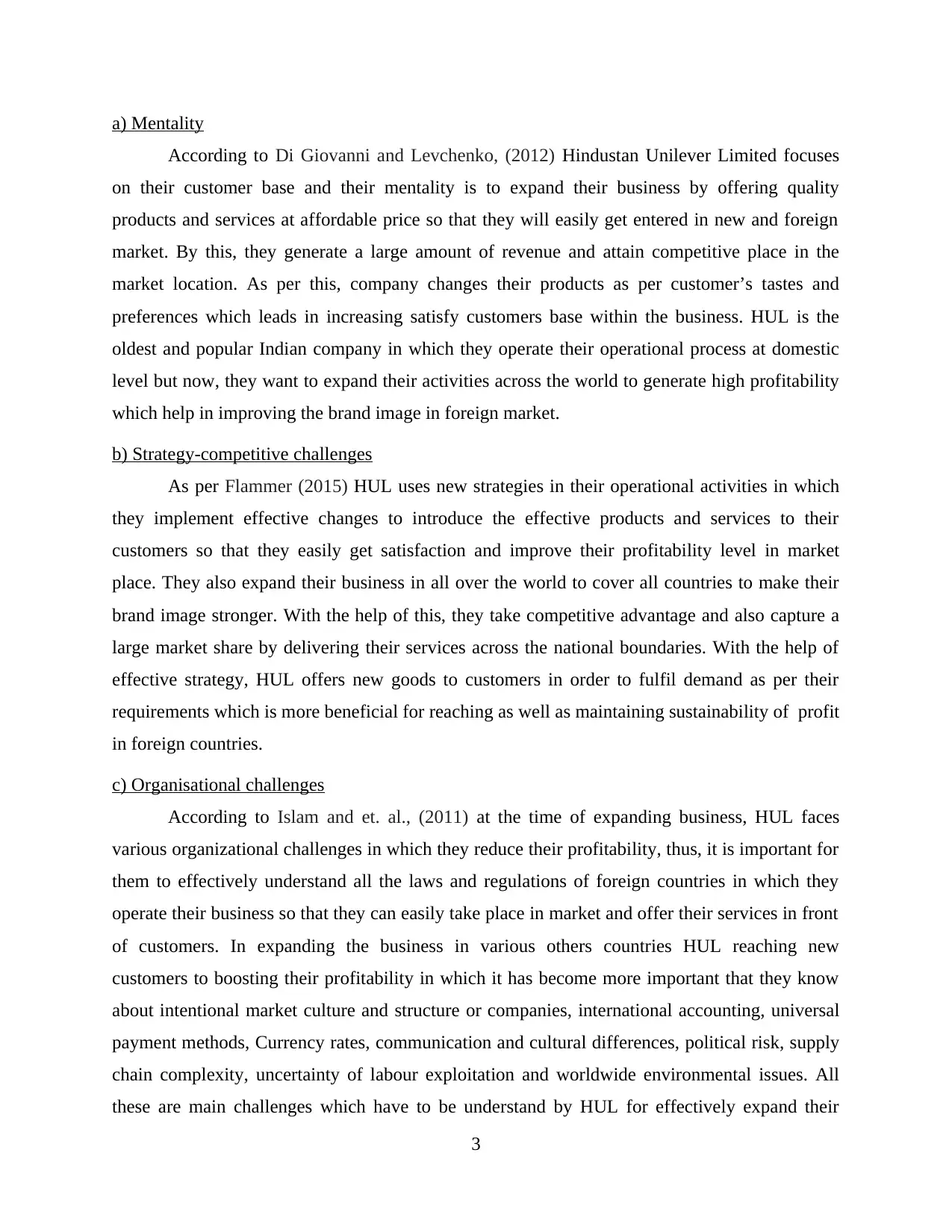
a) Mentality
According to Di Giovanni and Levchenko, (2012) Hindustan Unilever Limited focuses
on their customer base and their mentality is to expand their business by offering quality
products and services at affordable price so that they will easily get entered in new and foreign
market. By this, they generate a large amount of revenue and attain competitive place in the
market location. As per this, company changes their products as per customer’s tastes and
preferences which leads in increasing satisfy customers base within the business. HUL is the
oldest and popular Indian company in which they operate their operational process at domestic
level but now, they want to expand their activities across the world to generate high profitability
which help in improving the brand image in foreign market.
b) Strategy-competitive challenges
As per Flammer (2015) HUL uses new strategies in their operational activities in which
they implement effective changes to introduce the effective products and services to their
customers so that they easily get satisfaction and improve their profitability level in market
place. They also expand their business in all over the world to cover all countries to make their
brand image stronger. With the help of this, they take competitive advantage and also capture a
large market share by delivering their services across the national boundaries. With the help of
effective strategy, HUL offers new goods to customers in order to fulfil demand as per their
requirements which is more beneficial for reaching as well as maintaining sustainability of profit
in foreign countries.
c) Organisational challenges
According to Islam and et. al., (2011) at the time of expanding business, HUL faces
various organizational challenges in which they reduce their profitability, thus, it is important for
them to effectively understand all the laws and regulations of foreign countries in which they
operate their business so that they can easily take place in market and offer their services in front
of customers. In expanding the business in various others countries HUL reaching new
customers to boosting their profitability in which it has become more important that they know
about intentional market culture and structure or companies, international accounting, universal
payment methods, Currency rates, communication and cultural differences, political risk, supply
chain complexity, uncertainty of labour exploitation and worldwide environmental issues. All
these are main challenges which have to be understand by HUL for effectively expand their
3
According to Di Giovanni and Levchenko, (2012) Hindustan Unilever Limited focuses
on their customer base and their mentality is to expand their business by offering quality
products and services at affordable price so that they will easily get entered in new and foreign
market. By this, they generate a large amount of revenue and attain competitive place in the
market location. As per this, company changes their products as per customer’s tastes and
preferences which leads in increasing satisfy customers base within the business. HUL is the
oldest and popular Indian company in which they operate their operational process at domestic
level but now, they want to expand their activities across the world to generate high profitability
which help in improving the brand image in foreign market.
b) Strategy-competitive challenges
As per Flammer (2015) HUL uses new strategies in their operational activities in which
they implement effective changes to introduce the effective products and services to their
customers so that they easily get satisfaction and improve their profitability level in market
place. They also expand their business in all over the world to cover all countries to make their
brand image stronger. With the help of this, they take competitive advantage and also capture a
large market share by delivering their services across the national boundaries. With the help of
effective strategy, HUL offers new goods to customers in order to fulfil demand as per their
requirements which is more beneficial for reaching as well as maintaining sustainability of profit
in foreign countries.
c) Organisational challenges
According to Islam and et. al., (2011) at the time of expanding business, HUL faces
various organizational challenges in which they reduce their profitability, thus, it is important for
them to effectively understand all the laws and regulations of foreign countries in which they
operate their business so that they can easily take place in market and offer their services in front
of customers. In expanding the business in various others countries HUL reaching new
customers to boosting their profitability in which it has become more important that they know
about intentional market culture and structure or companies, international accounting, universal
payment methods, Currency rates, communication and cultural differences, political risk, supply
chain complexity, uncertainty of labour exploitation and worldwide environmental issues. All
these are main challenges which have to be understand by HUL for effectively expand their
3
⊘ This is a preview!⊘
Do you want full access?
Subscribe today to unlock all pages.

Trusted by 1+ million students worldwide
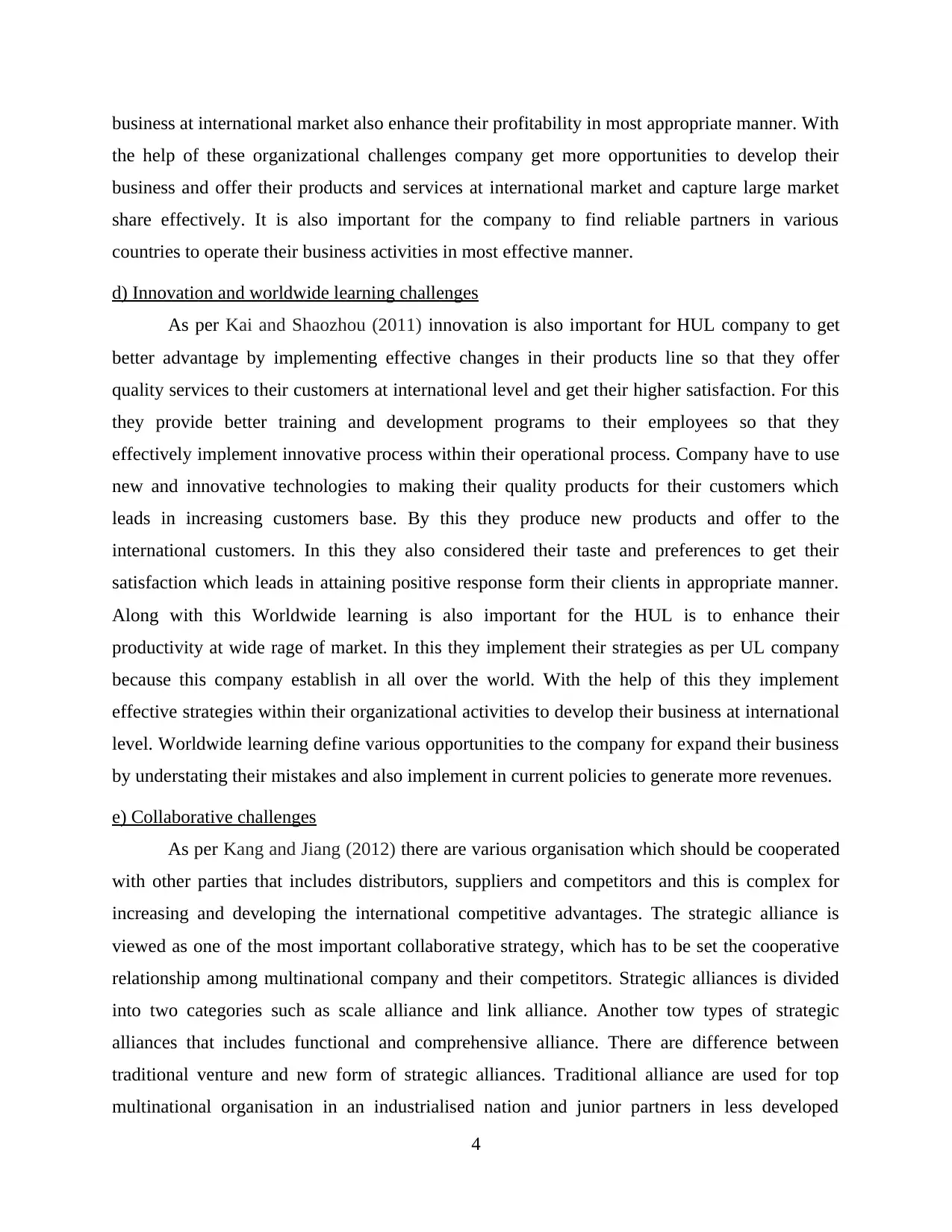
business at international market also enhance their profitability in most appropriate manner. With
the help of these organizational challenges company get more opportunities to develop their
business and offer their products and services at international market and capture large market
share effectively. It is also important for the company to find reliable partners in various
countries to operate their business activities in most effective manner.
d) Innovation and worldwide learning challenges
As per Kai and Shaozhou (2011) innovation is also important for HUL company to get
better advantage by implementing effective changes in their products line so that they offer
quality services to their customers at international level and get their higher satisfaction. For this
they provide better training and development programs to their employees so that they
effectively implement innovative process within their operational process. Company have to use
new and innovative technologies to making their quality products for their customers which
leads in increasing customers base. By this they produce new products and offer to the
international customers. In this they also considered their taste and preferences to get their
satisfaction which leads in attaining positive response form their clients in appropriate manner.
Along with this Worldwide learning is also important for the HUL is to enhance their
productivity at wide rage of market. In this they implement their strategies as per UL company
because this company establish in all over the world. With the help of this they implement
effective strategies within their organizational activities to develop their business at international
level. Worldwide learning define various opportunities to the company for expand their business
by understating their mistakes and also implement in current policies to generate more revenues.
e) Collaborative challenges
As per Kang and Jiang (2012) there are various organisation which should be cooperated
with other parties that includes distributors, suppliers and competitors and this is complex for
increasing and developing the international competitive advantages. The strategic alliance is
viewed as one of the most important collaborative strategy, which has to be set the cooperative
relationship among multinational company and their competitors. Strategic alliances is divided
into two categories such as scale alliance and link alliance. Another tow types of strategic
alliances that includes functional and comprehensive alliance. There are difference between
traditional venture and new form of strategic alliances. Traditional alliance are used for top
multinational organisation in an industrialised nation and junior partners in less developed
4
the help of these organizational challenges company get more opportunities to develop their
business and offer their products and services at international market and capture large market
share effectively. It is also important for the company to find reliable partners in various
countries to operate their business activities in most effective manner.
d) Innovation and worldwide learning challenges
As per Kai and Shaozhou (2011) innovation is also important for HUL company to get
better advantage by implementing effective changes in their products line so that they offer
quality services to their customers at international level and get their higher satisfaction. For this
they provide better training and development programs to their employees so that they
effectively implement innovative process within their operational process. Company have to use
new and innovative technologies to making their quality products for their customers which
leads in increasing customers base. By this they produce new products and offer to the
international customers. In this they also considered their taste and preferences to get their
satisfaction which leads in attaining positive response form their clients in appropriate manner.
Along with this Worldwide learning is also important for the HUL is to enhance their
productivity at wide rage of market. In this they implement their strategies as per UL company
because this company establish in all over the world. With the help of this they implement
effective strategies within their organizational activities to develop their business at international
level. Worldwide learning define various opportunities to the company for expand their business
by understating their mistakes and also implement in current policies to generate more revenues.
e) Collaborative challenges
As per Kang and Jiang (2012) there are various organisation which should be cooperated
with other parties that includes distributors, suppliers and competitors and this is complex for
increasing and developing the international competitive advantages. The strategic alliance is
viewed as one of the most important collaborative strategy, which has to be set the cooperative
relationship among multinational company and their competitors. Strategic alliances is divided
into two categories such as scale alliance and link alliance. Another tow types of strategic
alliances that includes functional and comprehensive alliance. There are difference between
traditional venture and new form of strategic alliances. Traditional alliance are used for top
multinational organisation in an industrialised nation and junior partners in less developed
4
Paraphrase This Document
Need a fresh take? Get an instant paraphrase of this document with our AI Paraphraser
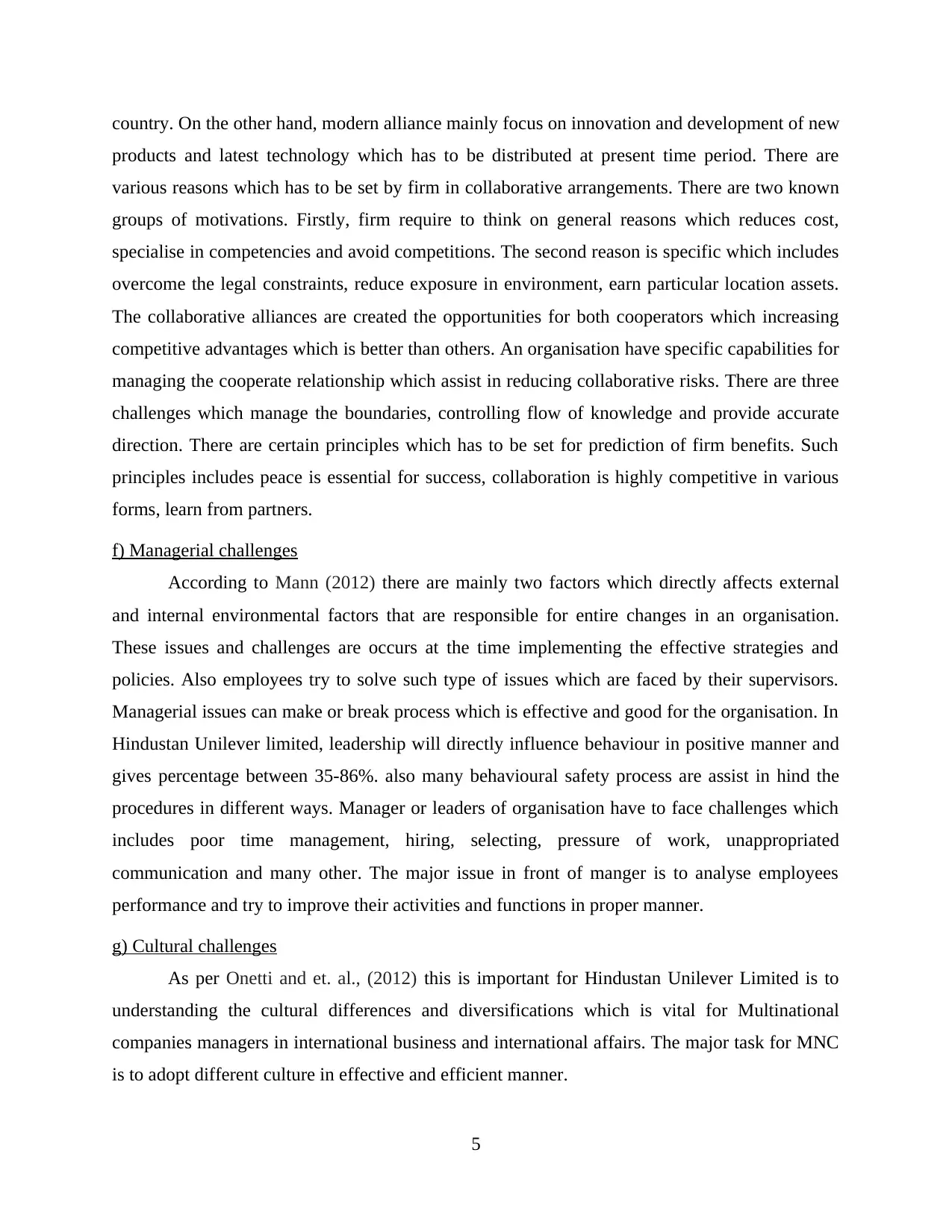
country. On the other hand, modern alliance mainly focus on innovation and development of new
products and latest technology which has to be distributed at present time period. There are
various reasons which has to be set by firm in collaborative arrangements. There are two known
groups of motivations. Firstly, firm require to think on general reasons which reduces cost,
specialise in competencies and avoid competitions. The second reason is specific which includes
overcome the legal constraints, reduce exposure in environment, earn particular location assets.
The collaborative alliances are created the opportunities for both cooperators which increasing
competitive advantages which is better than others. An organisation have specific capabilities for
managing the cooperate relationship which assist in reducing collaborative risks. There are three
challenges which manage the boundaries, controlling flow of knowledge and provide accurate
direction. There are certain principles which has to be set for prediction of firm benefits. Such
principles includes peace is essential for success, collaboration is highly competitive in various
forms, learn from partners.
f) Managerial challenges
According to Mann (2012) there are mainly two factors which directly affects external
and internal environmental factors that are responsible for entire changes in an organisation.
These issues and challenges are occurs at the time implementing the effective strategies and
policies. Also employees try to solve such type of issues which are faced by their supervisors.
Managerial issues can make or break process which is effective and good for the organisation. In
Hindustan Unilever limited, leadership will directly influence behaviour in positive manner and
gives percentage between 35-86%. also many behavioural safety process are assist in hind the
procedures in different ways. Manager or leaders of organisation have to face challenges which
includes poor time management, hiring, selecting, pressure of work, unappropriated
communication and many other. The major issue in front of manger is to analyse employees
performance and try to improve their activities and functions in proper manner.
g) Cultural challenges
As per Onetti and et. al., (2012) this is important for Hindustan Unilever Limited is to
understanding the cultural differences and diversifications which is vital for Multinational
companies managers in international business and international affairs. The major task for MNC
is to adopt different culture in effective and efficient manner.
5
products and latest technology which has to be distributed at present time period. There are
various reasons which has to be set by firm in collaborative arrangements. There are two known
groups of motivations. Firstly, firm require to think on general reasons which reduces cost,
specialise in competencies and avoid competitions. The second reason is specific which includes
overcome the legal constraints, reduce exposure in environment, earn particular location assets.
The collaborative alliances are created the opportunities for both cooperators which increasing
competitive advantages which is better than others. An organisation have specific capabilities for
managing the cooperate relationship which assist in reducing collaborative risks. There are three
challenges which manage the boundaries, controlling flow of knowledge and provide accurate
direction. There are certain principles which has to be set for prediction of firm benefits. Such
principles includes peace is essential for success, collaboration is highly competitive in various
forms, learn from partners.
f) Managerial challenges
According to Mann (2012) there are mainly two factors which directly affects external
and internal environmental factors that are responsible for entire changes in an organisation.
These issues and challenges are occurs at the time implementing the effective strategies and
policies. Also employees try to solve such type of issues which are faced by their supervisors.
Managerial issues can make or break process which is effective and good for the organisation. In
Hindustan Unilever limited, leadership will directly influence behaviour in positive manner and
gives percentage between 35-86%. also many behavioural safety process are assist in hind the
procedures in different ways. Manager or leaders of organisation have to face challenges which
includes poor time management, hiring, selecting, pressure of work, unappropriated
communication and many other. The major issue in front of manger is to analyse employees
performance and try to improve their activities and functions in proper manner.
g) Cultural challenges
As per Onetti and et. al., (2012) this is important for Hindustan Unilever Limited is to
understanding the cultural differences and diversifications which is vital for Multinational
companies managers in international business and international affairs. The major task for MNC
is to adopt different culture in effective and efficient manner.
5
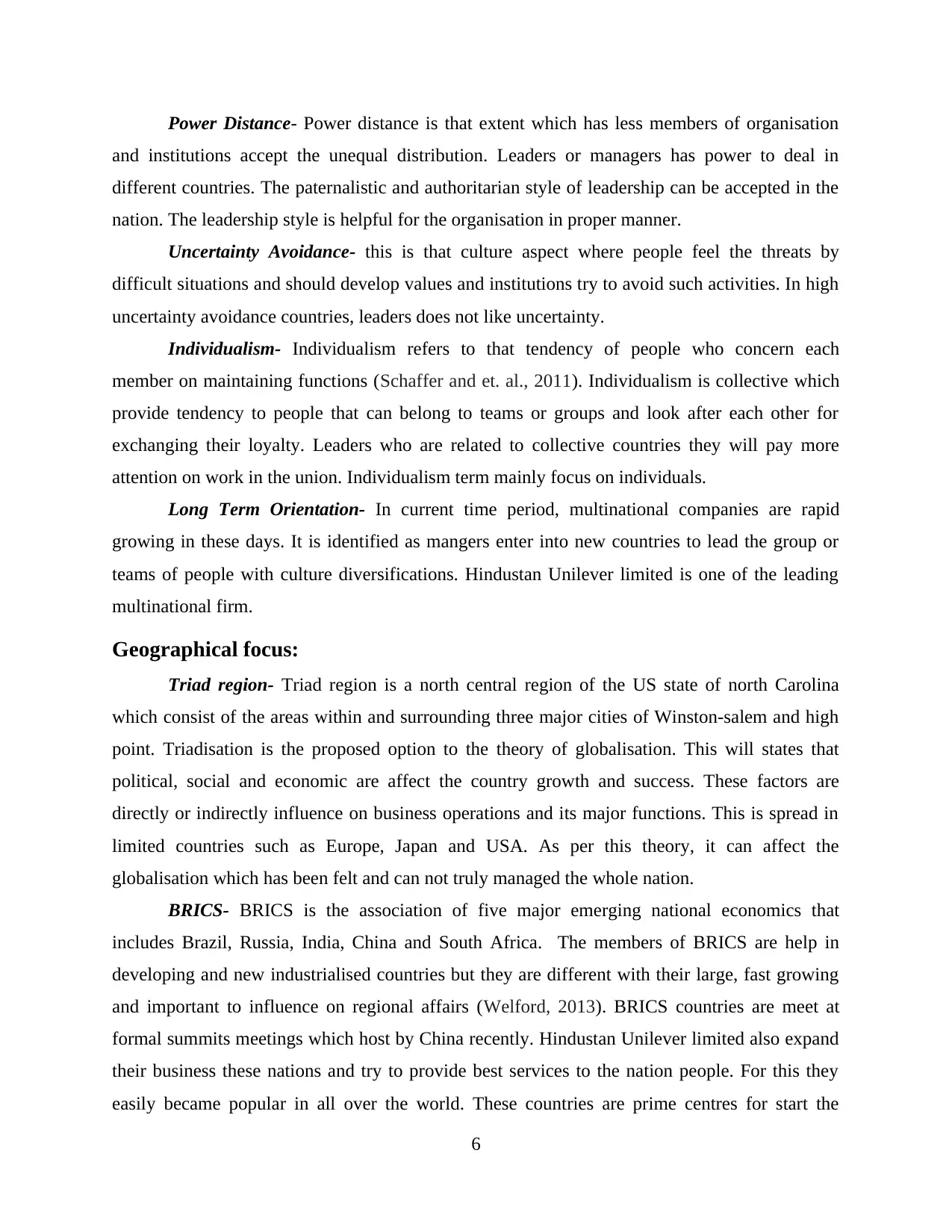
Power Distance- Power distance is that extent which has less members of organisation
and institutions accept the unequal distribution. Leaders or managers has power to deal in
different countries. The paternalistic and authoritarian style of leadership can be accepted in the
nation. The leadership style is helpful for the organisation in proper manner.
Uncertainty Avoidance- this is that culture aspect where people feel the threats by
difficult situations and should develop values and institutions try to avoid such activities. In high
uncertainty avoidance countries, leaders does not like uncertainty.
Individualism- Individualism refers to that tendency of people who concern each
member on maintaining functions (Schaffer and et. al., 2011). Individualism is collective which
provide tendency to people that can belong to teams or groups and look after each other for
exchanging their loyalty. Leaders who are related to collective countries they will pay more
attention on work in the union. Individualism term mainly focus on individuals.
Long Term Orientation- In current time period, multinational companies are rapid
growing in these days. It is identified as mangers enter into new countries to lead the group or
teams of people with culture diversifications. Hindustan Unilever limited is one of the leading
multinational firm.
Geographical focus:
Triad region- Triad region is a north central region of the US state of north Carolina
which consist of the areas within and surrounding three major cities of Winston-salem and high
point. Triadisation is the proposed option to the theory of globalisation. This will states that
political, social and economic are affect the country growth and success. These factors are
directly or indirectly influence on business operations and its major functions. This is spread in
limited countries such as Europe, Japan and USA. As per this theory, it can affect the
globalisation which has been felt and can not truly managed the whole nation.
BRICS- BRICS is the association of five major emerging national economics that
includes Brazil, Russia, India, China and South Africa. The members of BRICS are help in
developing and new industrialised countries but they are different with their large, fast growing
and important to influence on regional affairs (Welford, 2013). BRICS countries are meet at
formal summits meetings which host by China recently. Hindustan Unilever limited also expand
their business these nations and try to provide best services to the nation people. For this they
easily became popular in all over the world. These countries are prime centres for start the
6
and institutions accept the unequal distribution. Leaders or managers has power to deal in
different countries. The paternalistic and authoritarian style of leadership can be accepted in the
nation. The leadership style is helpful for the organisation in proper manner.
Uncertainty Avoidance- this is that culture aspect where people feel the threats by
difficult situations and should develop values and institutions try to avoid such activities. In high
uncertainty avoidance countries, leaders does not like uncertainty.
Individualism- Individualism refers to that tendency of people who concern each
member on maintaining functions (Schaffer and et. al., 2011). Individualism is collective which
provide tendency to people that can belong to teams or groups and look after each other for
exchanging their loyalty. Leaders who are related to collective countries they will pay more
attention on work in the union. Individualism term mainly focus on individuals.
Long Term Orientation- In current time period, multinational companies are rapid
growing in these days. It is identified as mangers enter into new countries to lead the group or
teams of people with culture diversifications. Hindustan Unilever limited is one of the leading
multinational firm.
Geographical focus:
Triad region- Triad region is a north central region of the US state of north Carolina
which consist of the areas within and surrounding three major cities of Winston-salem and high
point. Triadisation is the proposed option to the theory of globalisation. This will states that
political, social and economic are affect the country growth and success. These factors are
directly or indirectly influence on business operations and its major functions. This is spread in
limited countries such as Europe, Japan and USA. As per this theory, it can affect the
globalisation which has been felt and can not truly managed the whole nation.
BRICS- BRICS is the association of five major emerging national economics that
includes Brazil, Russia, India, China and South Africa. The members of BRICS are help in
developing and new industrialised countries but they are different with their large, fast growing
and important to influence on regional affairs (Welford, 2013). BRICS countries are meet at
formal summits meetings which host by China recently. Hindustan Unilever limited also expand
their business these nations and try to provide best services to the nation people. For this they
easily became popular in all over the world. These countries are prime centres for start the
6
⊘ This is a preview!⊘
Do you want full access?
Subscribe today to unlock all pages.

Trusted by 1+ million students worldwide
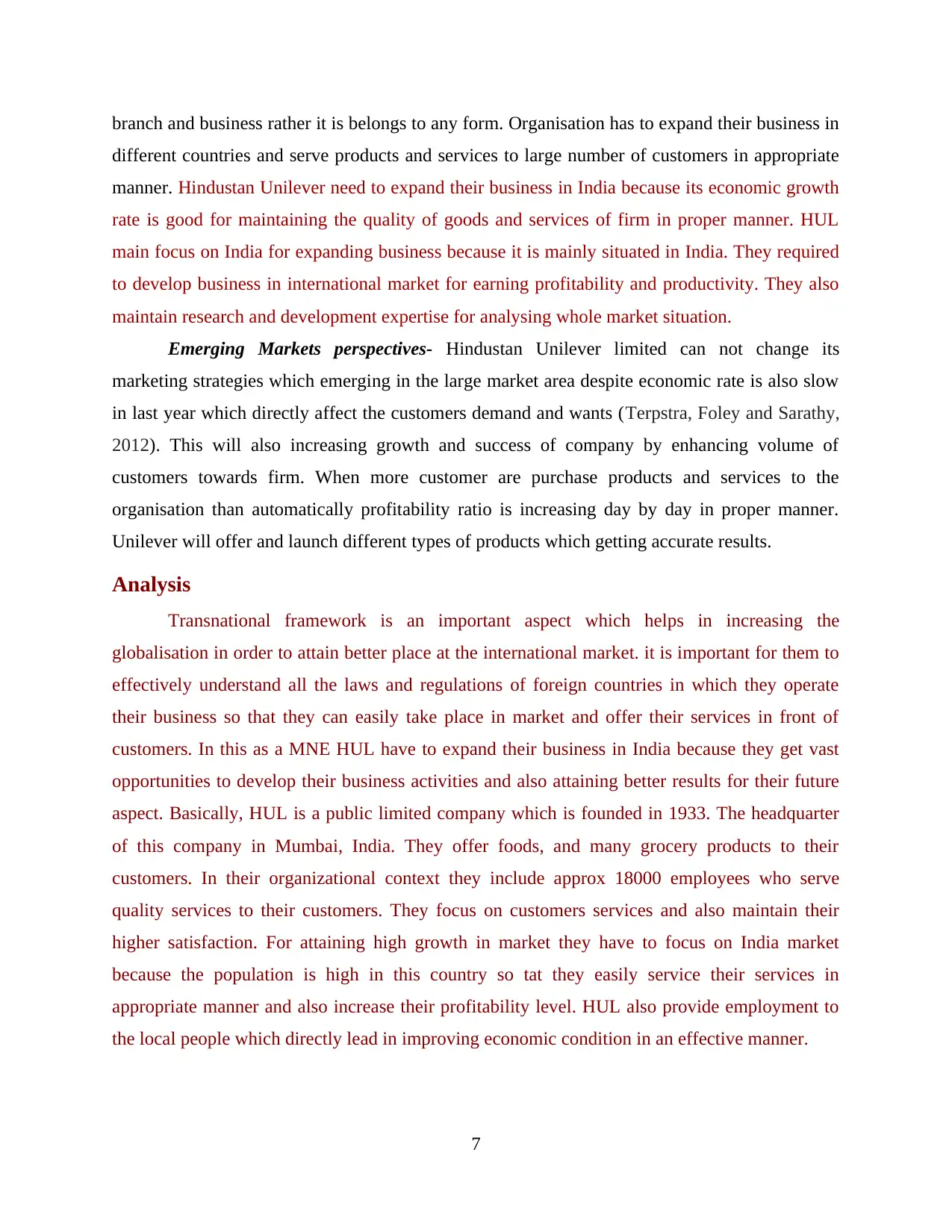
branch and business rather it is belongs to any form. Organisation has to expand their business in
different countries and serve products and services to large number of customers in appropriate
manner. Hindustan Unilever need to expand their business in India because its economic growth
rate is good for maintaining the quality of goods and services of firm in proper manner. HUL
main focus on India for expanding business because it is mainly situated in India. They required
to develop business in international market for earning profitability and productivity. They also
maintain research and development expertise for analysing whole market situation.
Emerging Markets perspectives- Hindustan Unilever limited can not change its
marketing strategies which emerging in the large market area despite economic rate is also slow
in last year which directly affect the customers demand and wants (Terpstra, Foley and Sarathy,
2012). This will also increasing growth and success of company by enhancing volume of
customers towards firm. When more customer are purchase products and services to the
organisation than automatically profitability ratio is increasing day by day in proper manner.
Unilever will offer and launch different types of products which getting accurate results.
Analysis
Transnational framework is an important aspect which helps in increasing the
globalisation in order to attain better place at the international market. it is important for them to
effectively understand all the laws and regulations of foreign countries in which they operate
their business so that they can easily take place in market and offer their services in front of
customers. In this as a MNE HUL have to expand their business in India because they get vast
opportunities to develop their business activities and also attaining better results for their future
aspect. Basically, HUL is a public limited company which is founded in 1933. The headquarter
of this company in Mumbai, India. They offer foods, and many grocery products to their
customers. In their organizational context they include approx 18000 employees who serve
quality services to their customers. They focus on customers services and also maintain their
higher satisfaction. For attaining high growth in market they have to focus on India market
because the population is high in this country so tat they easily service their services in
appropriate manner and also increase their profitability level. HUL also provide employment to
the local people which directly lead in improving economic condition in an effective manner.
7
different countries and serve products and services to large number of customers in appropriate
manner. Hindustan Unilever need to expand their business in India because its economic growth
rate is good for maintaining the quality of goods and services of firm in proper manner. HUL
main focus on India for expanding business because it is mainly situated in India. They required
to develop business in international market for earning profitability and productivity. They also
maintain research and development expertise for analysing whole market situation.
Emerging Markets perspectives- Hindustan Unilever limited can not change its
marketing strategies which emerging in the large market area despite economic rate is also slow
in last year which directly affect the customers demand and wants (Terpstra, Foley and Sarathy,
2012). This will also increasing growth and success of company by enhancing volume of
customers towards firm. When more customer are purchase products and services to the
organisation than automatically profitability ratio is increasing day by day in proper manner.
Unilever will offer and launch different types of products which getting accurate results.
Analysis
Transnational framework is an important aspect which helps in increasing the
globalisation in order to attain better place at the international market. it is important for them to
effectively understand all the laws and regulations of foreign countries in which they operate
their business so that they can easily take place in market and offer their services in front of
customers. In this as a MNE HUL have to expand their business in India because they get vast
opportunities to develop their business activities and also attaining better results for their future
aspect. Basically, HUL is a public limited company which is founded in 1933. The headquarter
of this company in Mumbai, India. They offer foods, and many grocery products to their
customers. In their organizational context they include approx 18000 employees who serve
quality services to their customers. They focus on customers services and also maintain their
higher satisfaction. For attaining high growth in market they have to focus on India market
because the population is high in this country so tat they easily service their services in
appropriate manner and also increase their profitability level. HUL also provide employment to
the local people which directly lead in improving economic condition in an effective manner.
7
Paraphrase This Document
Need a fresh take? Get an instant paraphrase of this document with our AI Paraphraser
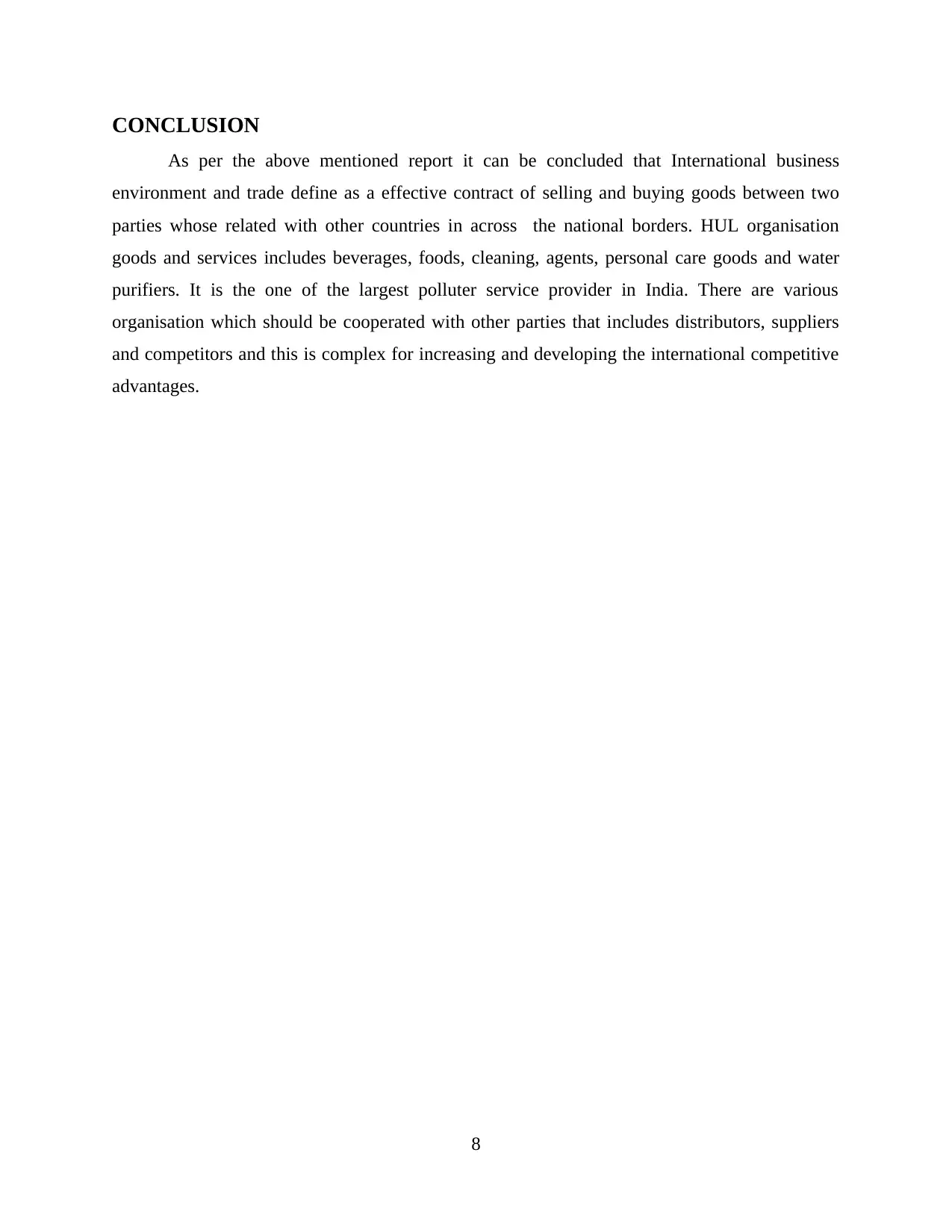
CONCLUSION
As per the above mentioned report it can be concluded that International business
environment and trade define as a effective contract of selling and buying goods between two
parties whose related with other countries in across the national borders. HUL organisation
goods and services includes beverages, foods, cleaning, agents, personal care goods and water
purifiers. It is the one of the largest polluter service provider in India. There are various
organisation which should be cooperated with other parties that includes distributors, suppliers
and competitors and this is complex for increasing and developing the international competitive
advantages.
8
As per the above mentioned report it can be concluded that International business
environment and trade define as a effective contract of selling and buying goods between two
parties whose related with other countries in across the national borders. HUL organisation
goods and services includes beverages, foods, cleaning, agents, personal care goods and water
purifiers. It is the one of the largest polluter service provider in India. There are various
organisation which should be cooperated with other parties that includes distributors, suppliers
and competitors and this is complex for increasing and developing the international competitive
advantages.
8
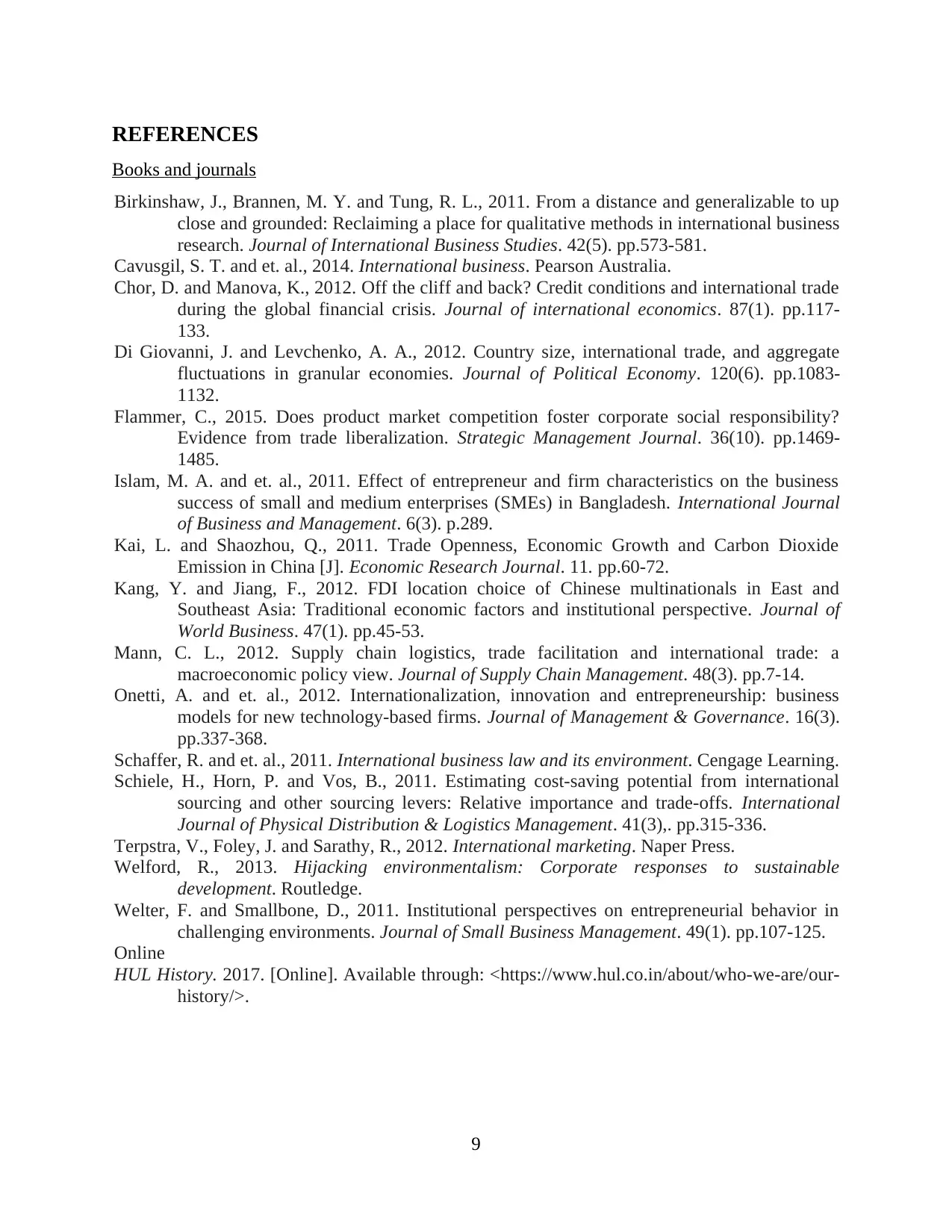
REFERENCES
Books and journals
Birkinshaw, J., Brannen, M. Y. and Tung, R. L., 2011. From a distance and generalizable to up
close and grounded: Reclaiming a place for qualitative methods in international business
research. Journal of International Business Studies. 42(5). pp.573-581.
Cavusgil, S. T. and et. al., 2014. International business. Pearson Australia.
Chor, D. and Manova, K., 2012. Off the cliff and back? Credit conditions and international trade
during the global financial crisis. Journal of international economics. 87(1). pp.117-
133.
Di Giovanni, J. and Levchenko, A. A., 2012. Country size, international trade, and aggregate
fluctuations in granular economies. Journal of Political Economy. 120(6). pp.1083-
1132.
Flammer, C., 2015. Does product market competition foster corporate social responsibility?
Evidence from trade liberalization. Strategic Management Journal. 36(10). pp.1469-
1485.
Islam, M. A. and et. al., 2011. Effect of entrepreneur and firm characteristics on the business
success of small and medium enterprises (SMEs) in Bangladesh. International Journal
of Business and Management. 6(3). p.289.
Kai, L. and Shaozhou, Q., 2011. Trade Openness, Economic Growth and Carbon Dioxide
Emission in China [J]. Economic Research Journal. 11. pp.60-72.
Kang, Y. and Jiang, F., 2012. FDI location choice of Chinese multinationals in East and
Southeast Asia: Traditional economic factors and institutional perspective. Journal of
World Business. 47(1). pp.45-53.
Mann, C. L., 2012. Supply chain logistics, trade facilitation and international trade: a
macroeconomic policy view. Journal of Supply Chain Management. 48(3). pp.7-14.
Onetti, A. and et. al., 2012. Internationalization, innovation and entrepreneurship: business
models for new technology-based firms. Journal of Management & Governance. 16(3).
pp.337-368.
Schaffer, R. and et. al., 2011. International business law and its environment. Cengage Learning.
Schiele, H., Horn, P. and Vos, B., 2011. Estimating cost-saving potential from international
sourcing and other sourcing levers: Relative importance and trade-offs. International
Journal of Physical Distribution & Logistics Management. 41(3),. pp.315-336.
Terpstra, V., Foley, J. and Sarathy, R., 2012. International marketing. Naper Press.
Welford, R., 2013. Hijacking environmentalism: Corporate responses to sustainable
development. Routledge.
Welter, F. and Smallbone, D., 2011. Institutional perspectives on entrepreneurial behavior in
challenging environments. Journal of Small Business Management. 49(1). pp.107-125.
Online
HUL History. 2017. [Online]. Available through: <https://www.hul.co.in/about/who-we-are/our-
history/>.
9
Books and journals
Birkinshaw, J., Brannen, M. Y. and Tung, R. L., 2011. From a distance and generalizable to up
close and grounded: Reclaiming a place for qualitative methods in international business
research. Journal of International Business Studies. 42(5). pp.573-581.
Cavusgil, S. T. and et. al., 2014. International business. Pearson Australia.
Chor, D. and Manova, K., 2012. Off the cliff and back? Credit conditions and international trade
during the global financial crisis. Journal of international economics. 87(1). pp.117-
133.
Di Giovanni, J. and Levchenko, A. A., 2012. Country size, international trade, and aggregate
fluctuations in granular economies. Journal of Political Economy. 120(6). pp.1083-
1132.
Flammer, C., 2015. Does product market competition foster corporate social responsibility?
Evidence from trade liberalization. Strategic Management Journal. 36(10). pp.1469-
1485.
Islam, M. A. and et. al., 2011. Effect of entrepreneur and firm characteristics on the business
success of small and medium enterprises (SMEs) in Bangladesh. International Journal
of Business and Management. 6(3). p.289.
Kai, L. and Shaozhou, Q., 2011. Trade Openness, Economic Growth and Carbon Dioxide
Emission in China [J]. Economic Research Journal. 11. pp.60-72.
Kang, Y. and Jiang, F., 2012. FDI location choice of Chinese multinationals in East and
Southeast Asia: Traditional economic factors and institutional perspective. Journal of
World Business. 47(1). pp.45-53.
Mann, C. L., 2012. Supply chain logistics, trade facilitation and international trade: a
macroeconomic policy view. Journal of Supply Chain Management. 48(3). pp.7-14.
Onetti, A. and et. al., 2012. Internationalization, innovation and entrepreneurship: business
models for new technology-based firms. Journal of Management & Governance. 16(3).
pp.337-368.
Schaffer, R. and et. al., 2011. International business law and its environment. Cengage Learning.
Schiele, H., Horn, P. and Vos, B., 2011. Estimating cost-saving potential from international
sourcing and other sourcing levers: Relative importance and trade-offs. International
Journal of Physical Distribution & Logistics Management. 41(3),. pp.315-336.
Terpstra, V., Foley, J. and Sarathy, R., 2012. International marketing. Naper Press.
Welford, R., 2013. Hijacking environmentalism: Corporate responses to sustainable
development. Routledge.
Welter, F. and Smallbone, D., 2011. Institutional perspectives on entrepreneurial behavior in
challenging environments. Journal of Small Business Management. 49(1). pp.107-125.
Online
HUL History. 2017. [Online]. Available through: <https://www.hul.co.in/about/who-we-are/our-
history/>.
9
⊘ This is a preview!⊘
Do you want full access?
Subscribe today to unlock all pages.

Trusted by 1+ million students worldwide
1 out of 12
Related Documents
Your All-in-One AI-Powered Toolkit for Academic Success.
+13062052269
info@desklib.com
Available 24*7 on WhatsApp / Email
![[object Object]](/_next/static/media/star-bottom.7253800d.svg)
Unlock your academic potential
Copyright © 2020–2026 A2Z Services. All Rights Reserved. Developed and managed by ZUCOL.





